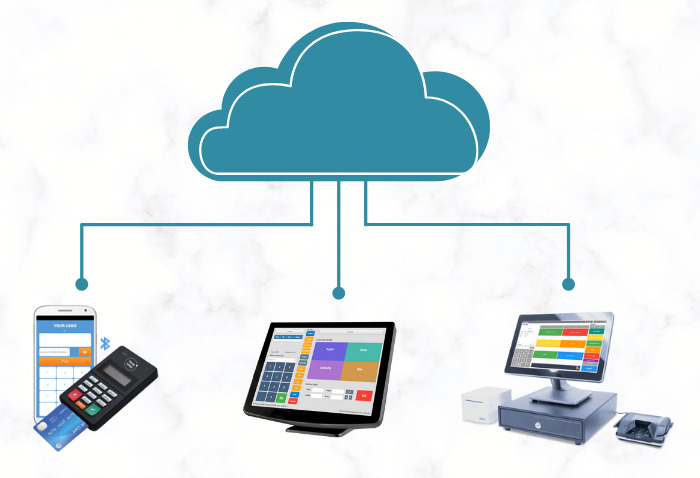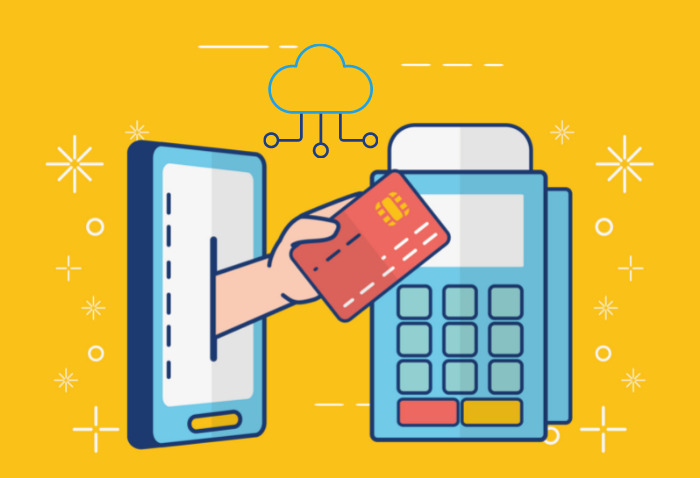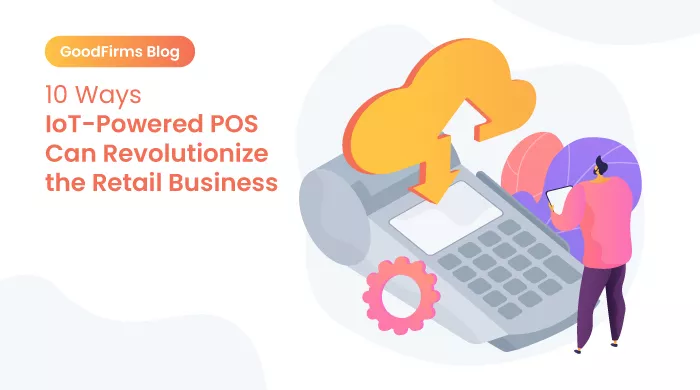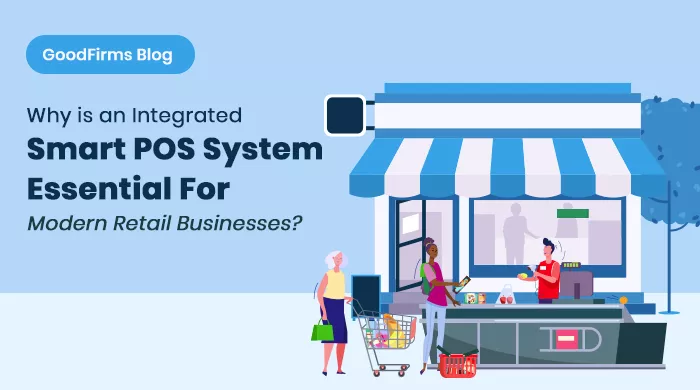In this digital transformation era, all businesses are planning to upgrade their traditional brick-and-mortar stores. From retail stores to restaurants, the aim is to amplify sales, streamline inventory management, and integrate faster payments. An advanced cloud-powered POS software system can efficiently suffice all such requirements for every enterprise, regardless of its size and type. Hence, investing in a cloud-based POS system is no more an alternative but a must-have tool that provides an upper edge to any business.
If you want to upgrade your knowledge on cloud-based POS solutions, stay on this page and continue reading the blog. But before discussing everything about the cloud-based POS system, you need to know what POS is?
What is a Point-of-Sale?
Point Of Sale is a specific point or place from where the customer makes a payment. It is a process that helps you in operating your complete sales seamlessly. Other than this, it helps you track your inventory and manage the working time of your employees.
A POS system is enabling business transactions between your business and your customers. It is purely an automated network consisting of systems linked up with numerous checkout terminals. This computerized network supports several hardware features from a barcode scanner device and ends with card payment processing terminals.
What is a Cloud-based POS System?
Once you have understood what a POS system is, it will now become easy for you to infer why your business should have a POS system. Sales generation is the fundamental goal of every business, so is yours. For this, you require a POS.
A cloud-based POS system is directly synced with the cloud. It is a system that impeccably processes transactions of your customers and stores your sales data securely with the help of the internet.
A cloud-based POS system, also termed an electronic POS, provides you with complete portability and enables you to access sales reports instantly so that you can make informed and real-time decisions. While talking about data security, cloud POS is reliable.
Using a cloud-based POS system, you no longer need to maintain those bulky and space-consuming cash registers. Besides, it saves plenty of floor space. The system can receive automatic updates allowing business to meet the workflow demands instantly.
Understanding the Cloud-based POS Systems Workflow

In the traditional approach, the POS stores data in local hard drives or closed on-premises networks. But most cloud-based POS systems are backed by Software-as-a-Service (SaaS) technology, compiling and storing data on the clouds. It means that anyone can access the data from any device having an internet connection.
Cloud-based POS systems make use of the high-end tools for perpetually updating sales information, thereby permitting merchants to acquire real-time, accurate data of their daily operations. With this accessibility, businesses can automatically evaluate sales metrics. Also, they can update menu items and inventory from anywhere.
The Types of Cloud-Based POS Systems

The cloud-based POS system is divided into three categories. All these POS systems are distant from one another due to the hardware, which helps access the tool.
- Mobile POS System
This system relies on tablets or smartphones to access a POS mobile app. Entrepreneurs who do not have any brick-and-mortar shops and operate their business through online platforms can use these systems. mPOS systems have more hardware to accept card payments, process payment terminals, print invoices, and many more.
- Online POS System
This again requires the hardware to access the system. It may include the laptop or desktop that you are using to accept payments. You also need additional equipment such as debit/credit card readers, barcode scanners, receipt printers, etc. The cost of this system is comparatively less than the terminal systems.
- Cloud-based Terminal POS
The system uses POS terminals for running systems. It is the most efficient type of cloud-based POS system for integrating a POS terminal with other hardware like debit/credit card readers, barcode scanners, etc.
Why Are Businesses Adopting Cloud-based POS Systems?

Today businesses have become trend followers and are keen to adopt the latest innovations occurring in their industries. Cloud-based POS systems have gained the spotlight providing many tangible benefits. Let’s discuss the critical advantages of implementing the cloud-based solution.
Cost-efficient
Transforming how POS was acquired and maintained in the past, a cloud-based POS system made handling sales data an effortless task. In a cloud-based POS system, you have to pay a lower monthly subscription to access the software, and there is no upfront hardware cost. The cloud-powered software can automatically update the tool to increase its efficiency.
Few reasons for its cost-efficiency include-
- Less complex installation
- Remotely performed maintenance
- Plenty of affordable options available in regards to hardware
Simple and User-Friendly
Once your store gets connected to the POS Software, it becomes easier to take, process, and manage orders efficiently. You need to link the POS app with the store simply, and the device starts providing real-time updates from the cloud.
Flexibility
There is an option where you can simply add or remove any functionality from the POS system. Thus you get the flexibility to use the tool as per your requirement.
Core Functions of POS System
The POS System has gained prominence due to its core functionalities that continuously update at regular intervals. Hence, it provides the business an edge over others. The critical functions include-
- POS systems provide various deployment options in addition to cloud-based software. For example, you can select open API applications or on-premise solutions. For example, Open API allows you to iterate with third-party apps or provide add-ons, such as online or mobile ordering, payment, and delivery.
- Check the latest programming language used to code and create the software. Also, check for the legacy code and make sure that it is at least ten years or more. If the code is not compatible with the older version of the POS system, there are bright chances that the system's functionality will suffer. If the functionality doesn't suffer, it may be very expensive or difficult to integrate the system with third-party services like delivery vendors.
- Many enterprises do not prefer to replace and buy a new POS system. Instead, they want those systems to get updated with the latest cloud solutions.
- Cloud POS generally runs on small-form, familiar devices like tablets or smartphones. But, if you have spent thousands of money on buying hardware, you would certainly like to extract more from the hardware. You can use cloud-based POS solutions with both Windows terminals and modern devices.
- The POS solution runs on small or local devices that create a backup for data without an internet connection. On the restoration of the internet connectivity, those local devices can re-sync the data on the cloud.
- Cloud POS solutions offer real-time insights and analytics, and actionable alerts.
Mobility
You can install and run the complete system on your smartphone. For restaurants, waiters can take debit/credit card payments while standing beside the customer's table. The receipt can be sent or emailed to the customer instantly. With complete mobility, your business can be managed from anywhere.
Nullify Downtime
A cloud-based POS solution almost nullifies the system downtime. It means that even if a particular system gets corrupted or crashes, you can continue with another mobile device until everything gets restored back. The software saves the entire data, which eliminates the possibility of data loss.
Robust Security
As the cloud stores all your data, there is no need to deal with accidents, cyber theft, and other calamities. All your data gets stored in several off-site servers. These off-site servers have 24*7 security and multiple redundancy layers.
Following methods are used for securing your database on the cloud:
- Advanced firewalls - Simple firewalls only examine the data's source as well as the destination. At the same time, an advanced firewall verifies the entire data and plots a diagram to know about the security threats.
- Intrusion detection – By this method, you can identify whenever someone attempts to access your database. With multiple detection levels, cybercriminals and hackers find it a hard nut to crack to penetrate into the database.
- Event logging – With this technique, you can record each network action. On recording activities, you can beforehand predict as well prevent cyber threats.
- Internal firewalls – The technique permits only limited access to accounts and data.
- Encryption – On stealing the encrypted files by the attacker, the system automatically denies the access. By this technique, you can rest assured that every data of yours is worthless to all those who don't have the key.
- Physical security – With armed guards or fingerprint locks, your cloud data is secure 24/7.
A Powerful Software Tool
When you compare a traditional system with cloud-based POS systems, you can quickly figure out how powerful the latter is. Below are a few powerful features that cloud-based POS system offers:
- Analytics & Reports – Using cloud technology, it becomes easy for you to leverage the data robustly and understand better your business performance. Also, reporting tools allow you to make instant decisions.
- Inventory Management – Cloud POS solutions can align with inventory management systems to manage inventory aptly, discover the products that need to be reordered. Also, you can keep tracking the inventory cost as well as your profit margin.
- Enhanced Marketing – With a cloud-based POS system, you can build an email list and send promotional emails to your customers. The email marketing software can simplify and streamline this task.
Wrapping Up
In this digital disruption era, businesses are preparing to invest in disruptive technologies and hit the new software market. The Cloud-based POS system is one of these that has enabled stores to handle sales, inventory, and manage customer data digitally. POS software has emphatically benefited all business domains, but it has completely changed the retail industry’s facet to make it more tech-savvy, customer-oriented, and progressive.
The popular cloud-powered systems include NetSuite SuiteCommerce, Lightspeed POS, Square, Quickbooks POS, Shopify POS, and many more.
You can also invest in the best free and open source POS Software, which will undoubtedly prove a profitable deal for your business. GoodFirms has created a buyer’s guide for all users and customers planning to purchase the POS tool. Do read it to make the best investment.
.jpg)


